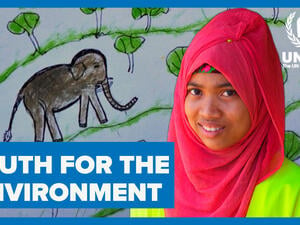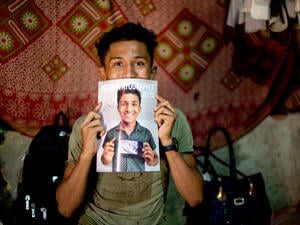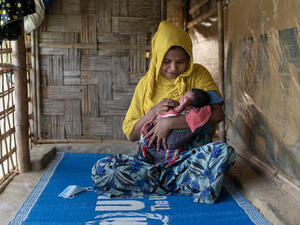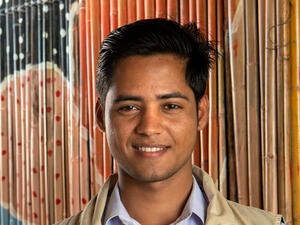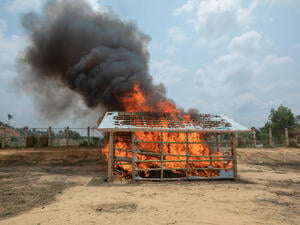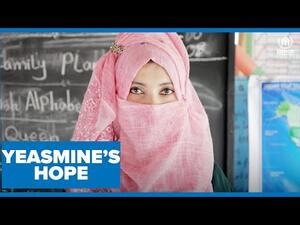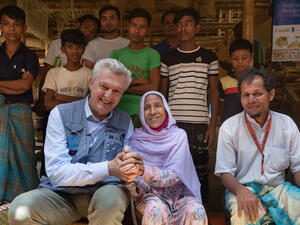After long ordeal at sea, Rohingya find humanity in Indonesia
After long ordeal at sea, Rohingya find humanity in Indonesia

A rescued boat woman and her two children eat some welcome food at a centre in Kuala Cangkoi, Indonesia.
LHOKSUKON, Indonesia, May 18 (UNHCR) - As governments in the region deliberate over what to do with boatloads of vulnerable people stranded at sea, the people of Indonesia have spoken.
In the last week, Indonesian fishermen have rescued more than 1,300 Bangladeshis and Rohingya from Myanmar after they drifted or swam to shore in the provinces of Aceh and North Sumatra. Local communities have mobilized donations of food, water as well as moral support - all desperately needed after the terrible ordeal the boat people have been through.
Fatimah*, aged 18 years, barely survived the journey. She decided to leave a camp housing displaced people in Sittwe, the capital of Rakhine state in Myanmar, after her fisherman husband was killed under mysterious circumstances over a year ago and she could no longer fend for herself and her two young daughters.
Hoping to join her sister in Malaysia, she gave everything she had - 200,000 kyats (US$180) - to board a smuggler's boat some three months ago. The boat made stops to transfer and take on more passengers, resulting in severe overcrowding. They were given food twice a day, sometimes rice, porridge, dried fish or potatoes. More than a week ago, the crew left on a speedboat and abandoned them in the open seas.
"The boat was then controlled by some of the passengers who knew how to steer one. We sailed until we ran out of gasoline," recalled Fatimah, noting that some people swam to get help. On May 10, the boat carrying 584 men, women and children from Myanmar and Bangladesh was rescued by local fishermen in Indonesia's Aceh.
"The fishermen and the local people are extremely helpful and kind to us," said Fatimah. "They took us to the closest mosque and allowed us to rest while providing us with food, water and snacks."
Her elder daughter, three-year-old Anwara, was sick from dehydration in the initial days. A local woman, Rusmawati, invited them home to clean up, and was worried to see that the little girl was still weak the next day.
"We speak a different language, it's very difficult to understand what they are saying, but I know that we have the same religion and we feel that they need to be helped," said Rusmawati, tearing up as she wished Anwara a quick recovery.
In the initial days the boat arrivals were housed in a sports hall in Lhoksukon under the coordination of Dinas Sosial, the district social and welfare office. As UNHCR worked to register the Rohingya among the group, food and clothes donated by the local people and government agencies kept flowing in. Three times a day local staff took turns to prepare meals for the group.
Ani, a second grade high school teacher who works an hour away, came with all her students and brought boxes of instant noodles and snacks. She later requested UNHCR staff to give a short sensitization session to explain why the refugees came and why people need to help them.
When it came time to move to another site last Wednesday, hundreds of locals gathered outside the sports hall, hoping to say goodbye to the people they'd cared so intensely for. The women shed tears of empathy and concern. Many of their unwitting guests shook their hands, trying to express gratitude for their generosity and affection.
"Anwara is better today," said Fatimah as she prepared to board the bus with her girls. "Only Allah can return their kindness to us."
More than 1,300 Rohingya and Bangladeshis have arrived in Indonesia's Aceh and North Sumatra provinces in the last week.
*Names changed for protection reasons
By Mitra Salima Suryono in Lhoksukon, Indonesia

